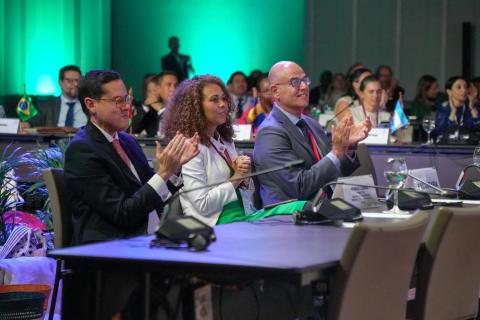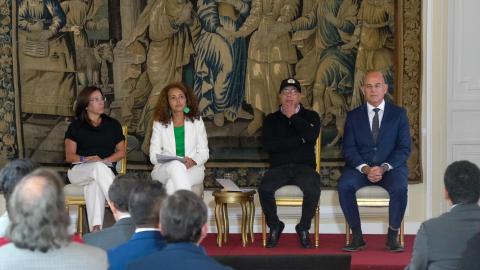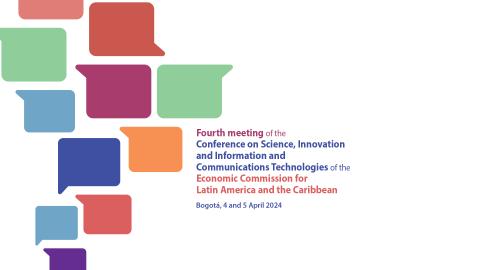News
The region of Latin America and the Caribbean must evaluate the impacts of the Trans-Pacific Partnership (TPP) not only in terms of access to new markets but also by weighing its contribution to countries’ diversification of production and exports, to the processes of regional integration and to the transition towards a digital economy, according to representatives gathered at ECLAC on Tuesday, April 5.
The seminar entitled The Trans-Pacific Partnership: Impacts for Latin America and the Caribbean was organized in Santiago by the Economic Commission for Latin America and the Caribbean (ECLAC) and the General Directorate of International Economic Relations (DIRECON) of Chile’s Ministry of Foreign Affairs.
The inauguration was headed by ECLAC’s Deputy Executive Secretary, Antonio Prado—in representation of the Executive Secretary, Alicia Bárcena—and Andrés Rebolledo, Chile’s General Director of International Economic Relations. Other participants included negotiators of the three Latin American countries included in the TPP (Chile, Mexico and Peru), along with academics, international officials, business leaders and representatives of civil society.
The TPP, signed on February 4 by 12 countries of the Americas, Asia and Oceania, is the first of a new generation of trade agreements with a vast reach, known as mega-regional accords, said Antonio Prado, who expressed ECLAC’s interest in continuing to study the impacts and implications of this pact with a comprehensive view. The TPP differentiates itself from other previous agreements “due to its simultaneously plurilateral and inter-regional nature,” he said. “Once it comes into effect it will constitute the greatest free-trade area of the world (measured by the combined GDP of its members),” he added.
“For Chile, this is an agreement of the greatest importance,” said Andrés Rebolledo, from DIRECON, who emphasized that the TPP “marks the boundaries in trade matters” and “is shaping the new rules of international trade.” The Chilean official anticipated that Congress will begin the formal process of debate to ratify it in the coming months, and said he hopes all of society will participate.
In a first assessment, the TPP is seen bringing about greater access to relevant markets, especially in agriculture, and incentives for productive integration via the accumulation of origin, among other opportunities, said Mario Cimoli, Director of ECLAC’s Production, Productivity and Management Division and Officer-in-Charge of the International Trade and Integration Division, who gave the first presentation of the meeting.
Nevertheless, questions remain with respect to countries’ autonomy to develop policies (on industry, innovation, foreign investment, the environment, labor, education, public health and culture) and how the TPP will impact Latin American regional integration, especially in the Pacific Alliance-MERCOSUR convergence, Cimoli warned.
In his opinion, “we should avoid a static evaluation (based on the current export structure) and adopt a dynamic evaluation (based on what countries wish to export 10 to 20 years from now).” “The TPP alone will not generate a dynamic process to diversify production and exports. If it is not accompanied by the appropriate policies (industrial, technological and innovation-related), the transition towards a digital economy could even be hindered,” he said.
In the afternoon, there was a roundtable dedicated to the views from civil society. Participants included José Aylwin, Co-director of the Citizens’ Observatory in Chile; Ana Romero Cano, Executive Director of the Peruvian Network for Globalization with Equality; and Alfredo Tourné, member of the Honor and Justice Committee of the Coalition for Legal Access to Culture in Mexico; they expressed criticism of the agreement’s negotiation process in their respective countries and voiced concern over the participation of civil society, and indigenous peoples in particular, in the current stage of ratification.
On another panel, representatives from the business sector made presentations, including Manuel José Prieto, International and Foreign Trade Manager of the Chilean Federation of Industry (SOFOFA); Rafael Arribas, Manager of International Affairs of the Peruvian Society of Foreign Trade (COMEXPERU); and Edgar Ubbelohde, adviser to the Mexican National Chamber of Electrical Manufacturers (CANAME).
The TPP was signed by Australia, Brunei Darussalam, Canada, Chile, Japan, Malaysia, Mexico, New Zealand, Peru, Singapore, the United States and Vietnam and is currently awaiting ratification within the respective countries.



